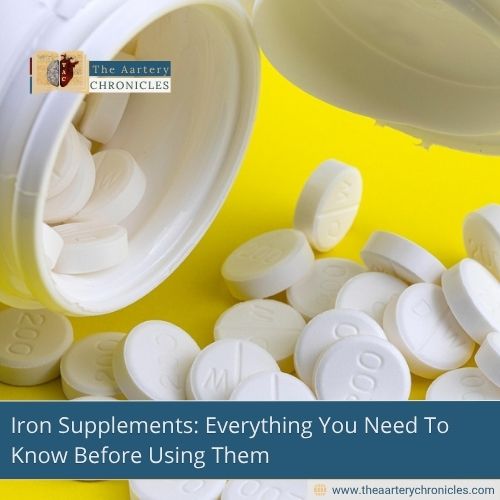

Iron Supplements: Everything You Need To Know Before Using Them
Introduction
Iron supplements are a common solution for those suffering from iron deficiency, a problem that affects millions of people worldwide, especially women and the elderly. Iron is a mineral essential for the production of hemoglobin, a protein that carries oxygen to tissues. A deficiency can cause fatigue, weakness, and, in severe cases, anemia. This article will explore what iron supplements are, when to take them, and best practices for maximizing their effectiveness.
Iron intake can be challenging, as the body isn’t always able to absorb it easily, and improper use can lead to unwanted side effects. We’ll explore how to manage this deficiency safely and effectively, analyzing recent studies and practical tips that can help improve your health.
What Are Iron Supplements And Why Are They Important?
Iron Deficiency: A Common Deficiency
Iron deficiency is one of the most common nutritional conditions globally. According to the World Health Organization, approximately 25% of the world’s population suffers from anemia, and the main cause is iron deficiency. This deficiency can be caused by several factors, including a poor diet, intestinal absorption problems, or increased iron requirements, such as during pregnancy or following blood loss.
Iron supplementation becomes essential when you can’t meet your needs through diet alone. Supplements are available in various forms, including capsules, tablets, and liquids, and can contain different types of iron, such as ferrous sulfate, ferrous gluconate, and ferrous fumarate.
The Importance Of Iron For Health
Iron plays a crucial role in the formation of hemoglobin, the protein responsible for carrying oxygen in the blood. An iron deficiency can reduce the body’s ability to oxygenate tissues, causing symptoms such as chronic fatigue, difficulty concentrating, and pale skin. In more severe cases, the deficiency can lead to anemia, a condition requiring medical attention and, in many cases, the use of supplements.
Types Of Iron Supplements: Which One To Choose?
The different forms of supplements
Not all iron supplements are created equal. There are different types of iron available on the market, each with specific characteristics that affect absorption and tolerability.
- Ferrous sulfate: This is the most common and least expensive form of iron. It is often prescribed by doctors to treat iron deficiency, but it can cause gastrointestinal side effects such as nausea and constipation.
- Ferrous gluconate: A gentler and better tolerated form than ferrous sulfate. It is often recommended for those with digestive problems.
- Ferrous fumarate: Another common alternative that has a higher concentration of elemental iron than ferrous sulfate. Again, tolerability depends on the individual.
Iron Absorption: What You Need to Know
Not everyone absorbs iron equally. Iron absorption is influenced by several factors, including the type of iron consumed and the presence of other substances in the diet. Heme iron, which comes from animal sources such as meat and fish, is more easily absorbed than non-heme iron, which is found in plants.
Some foods, such as those rich in vitamin C (oranges, peppers, broccoli), can enhance the absorption of non-heme iron, while others, such as tea, coffee, and dairy products, can inhibit it. For this reason, it’s recommended to take iron supplements with a glass of orange juice or another source of vitamin C, while avoiding tea or milk.
How To Manage Iron Supplementation: Practical Tips
- When to take iron supplements: It’s important to know when and how to take iron supplements to maximize their effectiveness and minimize side effects. It’s best to take them on an empty stomach for better absorption, but many people find this causes gastrointestinal discomfort. In these cases, it may be helpful to take iron with a light meal.
- Side effects and how to mitigate them: Common side effects of iron supplements include nausea, constipation, and abdominal cramps. If you experience these problems, consider changing the supplement form (for example, from ferrous sulfate to ferrous gluconate) or temporarily reducing the dose to allow your body to adjust. Additionally, drinking plenty of water and increasing your fiber intake can help prevent constipation.
- Monitoring iron deficiency: If you’ve been diagnosed with iron deficiency, it’s important to monitor your blood levels regularly. Improvement in symptoms may take several weeks or months, and treatment may be necessary for a prolonged period. Your doctor may recommend repeat blood tests to assess the effectiveness of the treatment and, if necessary, adjust your treatment.
Conclusion
Iron supplements are a fundamental resource for those suffering from iron deficiency. However, choosing the right supplement and how it is taken can make a big difference in the effectiveness of treatment and the prevention of side effects.
If you suspect you have an iron deficiency, the first step is to consult your doctor for an accurate diagnosis. Not everyone needs supplements, and self-medication can lead to iron overload, an equally dangerous condition.
Finally, it’s crucial to remember that prevention is key. Eating a balanced diet, rich in iron-containing foods, and having regular medical checkups can help maintain optimal iron levels and avoid future complications.









